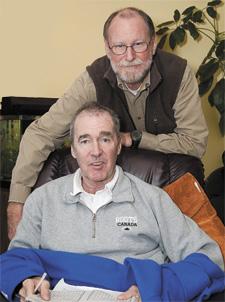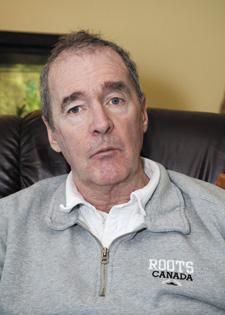
Allan Dowrey (top) didn't exactly know his brother was gay before Ritchie got gaybashed. "There was no discussion," Allan says. "That was his privacy space. Doesn't really matter, as far as I'm concerned," he adds. Credit: Janet Rerecich
March 13, 2009.
A typical night at The Fountainhead Pub on Davie St.
Ritchie Dowrey is celebrating his retirement among friends. He’s a well-loved man, friendly and fun-loving with an infectious, easy laugh and a kind word for everyone.
A regular at the pub, he can usually be found either at the pool table or at his favourite spot at the corner of the bar. He never misses a Lions’ or Canucks’ game.
His friend racks up the balls to start a new game of pool. A double Bombay gin with a twist of lemon waits for him at the bar.
He’s smiling. He’s raising his hand, possibly hoping to high-five the man he earlier offered a drink. The man who is now approaching him.
And then there’s a sickening thud.
***
Oct 21, 2010. I’m standing outside a care home in Langley, wondering what to expect. I never met Ritchie Dowrey in all the years he frequented The Fountainhead. I’m not sure who I’m going to meet now.
His brother, Allan, greets me and leads me inside to some chairs by a window, flanked by a fish tank and a muted TV.
A man in a recliner looks up as I approach. It’s Ritchie, wrapped in a blue Snuggie blanket, his thin legs poking out the end. He holds a clipboard in one hand, the TV remote in the other. His blue eyes are kind of dull. His bottom front teeth are missing.
I introduce myself and tell him his Fountainhead friends miss him.
He says he doesn’t remember The Fountainhead.
He doesn’t remember Davie St.
He doesn’t remember his life.
The assault left Ritchie with bleeding on the brain, a shift in his brain position and a skull fracture.
He needed 47 staples on his head, Allan tells me, tracing a line from my temple to the bottom of my ear to illustrate their trajectory.
“I counted them all,” he says. The doctors had to relieve the pressure on his brother’s brain to keep him alive.
Two months later, Ritchie still couldn’t move his left side and had only minor motion on his right.
His right hand was clenched, Allan remembers. He had to learn how to extend his arm and grasp things again.
He had to learn how to walk again. How to talk. How to eat and sleep and go to the bathroom.
“This is a therapy house,” Allan says. “It’s to get those physical things working again.”
He’s making progress, Allan says, though he will never again be able to independently meet all his physical needs.
Then there’s the cognitive question.
***
“You remember The Fountainhead,” Allan gently prompts his brother.
“Yeah, that was your watering hole,” a staff member offers as she walks over to check on us.
The memories don’t register.
You lived on a boat nearby, Allan says.
“Where was that?” I ask Ritchie.
“In the water,” he promptly replies, surprising me.
At Allan’s urging, Ritchie shows me the pages on his clipboard. They’re puzzles, words hidden in grids, written backwards, forwards, diagonally. Ritchie is methodically finding and circling the words.
He works on those puzzles for hours, Allan later tells me.
“I don’t know if you noticed, but some of those words are backwards,” he says. “I can’t do them!”
“It gives me something to do,” Ritchie says.
***
“I want to live downtown or in West Vancouver again,” Ritchie tells me. “I’m out in the middle of nowhere here.”
“West Vancouver would be okay too,” he says. “But downtown would be better.”
Earlier in the day, he was assessed for a new care home.
Now he contemplates getting another boat. “I have no idea what happened to them,” he says, meaning his old boats.
If he lived downtown again he would go for walks, he says.
“I lived there for years and years and years.”
I ask him if he would visit his friends at The Fountainhead.
“I can’t remember them,” he says.
“I can’t remember what it is.”
“Do you remember going to the last Lions’ game?” Allan asks him.
Ritchie’s not sure.
“You were there in your wheelchair,” Allan prompts.
“I’d love to do it again,” Ritchie says.
He’s still a big football fan, but the Lions aren’t doing so well this year, he tells me.
They’re playing at Empire Field now, I say.
“Yeah, I’ve been there recently,” he replies.
***
“I have no idea if I’d be good at it,” Ritchie suddenly says to Allan.
He’s referring to selling cameras, picking up on an earlier thread of conversation about his past professions.
Ritchie was a stockbroker for years before he switched back to selling cameras and moved to West Vancouver about three years ago.
Allan offers to bring Ritchie his camera next time he visits.
I ask Allan later if he thinks Ritchie might ever be able to sell cameras again.
“No, he’s not competent,” he says.
“His competency, basically, is not there.”
***
I ask Ritchie how old he is.
“Sixty-something,” he says. He can’t be more precise.
“I don’t remember a thing from the 40s and 50s,” he adds.
I ask him why.
“I don’t know,” he says.
His ability to remember things changes, Allan tells me later. He remembers different things at different times.
He remembers being a stockbroker and working and living downtown and walking everywhere and taking the bus, Ritchie tells me at one point.
But he doesn’t remember anything else about being a broker.
Nor does he know who cut his hair since his brother’s last visit.
Nor does he remember the assault.
“There’s a trial tomorrow for the guy who hit you,” Allan tells his brother.
“Do you remember that? Do you remember the guy who hit you?” I ask.
Ritchie says no.
Pauses.
“He hit my head,” he offers.
“We’ve told him what happened but he doesn’t understand,” Allan tells me later.
“He’s always asking, ‘Did I do something wrong?’”
“I explain to him, ‘You were assaulted.’”
***
“I hope I’ll get better one of these days,” Ritchie says, pointing at himself. “I hope so.”
“You’re already better than you were two months ago,” Allan tells him.
“Really? Good,” Ritchie smiles.
In the last few months, he’s become “much more verbal,” Allan says. “He’s completing topics. He has connection points.”
“He wasn’t doing that six months ago,” he says. “He wasn’t connecting the dots.”
***
I ask Ritchie what he thinks of the recliner his Fountainhead friends bought for him with the money they raised at a pool tournament.
“It’s very nice, very nice,” he says.
I tell him how much his friends care about him.
“Thank you, thank you,” he says.
“Where should I live?” he suddenly asks Allan.
“I hope they have Vancouver or West Vancouver,” he says. “I hope so, I hope so.”
As Allan walks away to talk to the staff, Ritchie turns to our photographer, Janet, and asks her where she lives.
Downtown, she tells him.
“Very nice, very nice,” he says.
I ask him again if he remembers Davie St. At first he says no. Then, a flare of recognition.
It’s the “main street of the West End,” he says.
He suddenly remembers going to Queen’s for a beer after work then going to Lions’ games, then walking down the hill to his apartment.
I tell him I hope he gets to live downtown again.
“It doesn’t have to be big,” he says. “It can be a small apartment.”
“I just have to get this leg fixed,” he says.
“The only thing holding me back is the leg.”
“What’s wrong with it?” I ask.
“It’s not strong.”

 Why you can trust Xtra
Why you can trust Xtra


